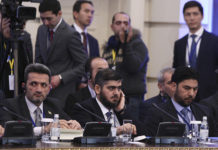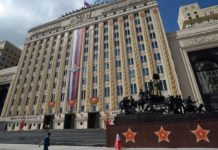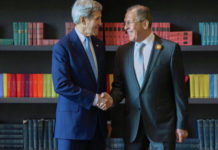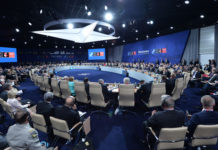Alexei Zabrodin
Nezavisimaya Gazeta, August 16, 2016, p. 6
Foreign Minister of Germany Frank-Walter Steinmeier arrived to Yekaterinburg where he met with Russian colleague Sergei Lavrov.
DONETS BASIN BECAME THE MAIN TOPICS OF THE MEETING OF LAVROV AND STEINMEIER
Foreign Minister of Germany Frank-Walter Steinmeier arrived to Yekaterinburg where he met with Russian colleague Sergei Lavrov. They participated in opening of the Russian-German summer school “Ways of development of the energy sector. Modern challenges,” a joint educational event of the Urals Federal University and German institute TU-Campus EUREF. According to Lavrov, there is crisis in relations of Moscow and Berlin still but Steinmeier is convinced that “it is not necessary to turn backs to each other.”
Ukrainian and Syrian crises became the main topics of negotiations of Lavrov and Steinmeier. According to the German Foreign Minister, it is possible to implement the Minsk agreements still, especially the point related to the “law on local elections, amnesty and special status.” Steinmeier is convinced that Minsk agreements “should be a compass for achievement of mutual understanding including understanding in such situations as the recent incident on the border with Crimea.
Incidentally, Lavrov said that Russia had “undeniable proofs” that the main intelligence directorate of the Defense Ministry was directly related to the Crimean subversion and the provocateurs on the border had only one goal, namely destabilization of the situation in “Russian Crimea.” The minister stressed that Moscow was ready to provide more facts to Western partners to prove involvement of Kiev into the subversion. He also said that in the course of negotiations with Steinmeier “prospects and possibilities of restarting of negotiations in the “Normandy format” were evaluated and it was inevitably impacted by the “recent raid of Ukrainian saboteurs in Crimea as a result of which Russian servicemen died.” According to him, implementation of Minsk-2 is also hindered due to the fault of Ukraine. For example, Kiev wants “once again to revise the Minsk agreements” and sabotages implementation of the “Steinmeier formula,” a proposal of the German minister to grant special status to Donets Basin.
In the last few days, relations between Moscow and Kiev were heated to the limit although it seemed that it was already impossible to heat them more. Ukraine did not approve the candidacy of the new Russian Ambassador deciding that it was possible to maintain relations eve without him and Prime Minister Dmitry Medvedev did not rule out even termination of diplomatic relations with the neighboring country. Many Western politicians called on Moscow and Kiev to quiet down. Lavrov soothed the Western public down, “I do not think that we are in a situation now when someone is interested in termination of diplomatic relations. It seems to me that the main thing now is not to yield to emption, not to fall into some extreme options of actions but to provide stabilization of the situation in a reserved and concentrated way.” Actually speaking, the entire international community started calling for this urgently as soon as a fire of war nearly started on the Crimean-Ukrainian border.
The ministers also touched on another hot topic, the Syrian conflict. Although in Syria contradictions of Russia and the West are not as acute as in Ukraine at first glance because the declared goal of this war is common, namely destruction of Islamic State (a group prohibited in Russia), differences of opinions can be seen by an unarmed eye. Leaving apart a different position about President Bashar Assad, Moscow and the West cannot come to agreement who is an opposition member and who is an Islamist still.
Lavrov did not forget to mention this too. He said that the task of separation of moderate opposition from Islamic State or Jabhat al-Nusra (prohibited in Russia) was set a long time ago “but it is not being fulfilled still.” Moreover, the so-called moderate opposition coordinates “its actions with terrorists” increasingly often, which, of course, “concerns us.” According to the Russian minister, one of the main tasks of the international community now is “solving of humanitarian problems in many parts of Syria, for example, in Aleppo.”
At any rate, Steinmeier confessed that “interference of Russia in Syria was unexpected” and added that Moscow bore a special responsibility for Aleppo, especially “in provision of humanitarian access.” According to him, it is possible to resolve the Syrian conflict “only in cooperation” and “when the period of post-crisis restoration of Syria begins Germany and Russia should work together.”
The ministers also talked about the Russian-German relations and about cooperation of Moscow and Brussels. According to Steinmeier, there are many supporters of rapprochement of Russia and the EU in the West and he supports them fully. There is no confrontation between the parties now and moreover so Russia and the West may even cooperation on Ukraine and Syria. The German minister announced, “I advocate use of the Russia-NATO council, especially in difficult times.” However, as Lavrov remarked, “NATO does not wish to discuss restoration of relations.”














